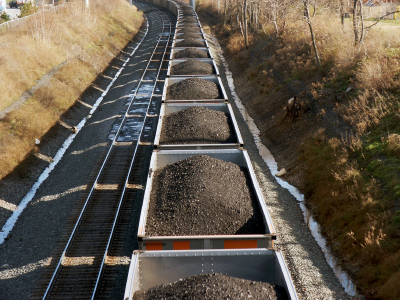 Don’t let the coal industry fool you, it’s still going strong.To hear people in the industry tell it, coal is on its last legs, about to be wiped out in what one lobbyist has described as a “regulatory jihad.” Don’t buy it for a minute — Big Coal is as powerful as ever.
Don’t let the coal industry fool you, it’s still going strong.To hear people in the industry tell it, coal is on its last legs, about to be wiped out in what one lobbyist has described as a “regulatory jihad.” Don’t buy it for a minute — Big Coal is as powerful as ever.
The empire strikes back: That’s the message from author Jeff Goodell, who points out that consumption of coal keeps rising, new plants keep getting built, and coal boosters and climate change skeptics keep getting elected. He also outlines the industry’s roots to the anti-science fervor that’s spreading like kudzu in Washington. [e360]
Indeed, the triumph of coal is deeply connected with an anti-science agenda, and always has been. Over the years, the industry has argued that air pollution from coal plants doesn’t cause an increase in heart attacks; that mercury, a potent neurotoxin emitted from coal plants, does not cause neurological damage; that mountaintop removal mining does not hurt the environment; and that burning coal does not heat up the atmosphere. All these arguments fly in the face of science — and, often, in the face of common sense. But it doesn’t matter. Coal is an empire of denial.
There’s the scrub: James Fallows, writing for The Atlantic, offers a very different take. He argues that like it or not, coal is going to remain a key energy source around the world for awhile — which, he says, makes it that much more critical to find a way to scrub it clean of carbon emissions. And Fallows contends that if anyone’s going to come up with a solution, it’s likely to be scientists and engineers in China. [The Atlantic]
The Chinese system as a whole has great weaknesses as well as great strengths. Its challenges … make the threats facing America look trivial by comparison. But its response to the energy challenge — including its commitment to dealing with the dirty, unavoidable reality of coal — reveals a seriousness about facing big problems that America now appears to lack.
Jobs won: So it shouldn’t come as a big surprise that General Electric is planning to invest more than $2 billion in China in technology, financial service ventures, and research. They’ll also create about another 1,000 jobs there. [Bloomberg]
And in other green news:
Tales from the dark side: The worm turned on BP during the second day of hearings by the presidential commission investigating the Gulf oil spill. After comments by the commission’s chief investigator Monday seemed to soften suggestions that BP cut corners to save money, yesterday the oil giant was portrayed in a much darker light — from allusions by the panel’s co-chair to a “culture of complacency” to testimony by engineers that BP’s plans were “totally deficient.” [Washington Post]
Good to see he’s still keepin’ it real: And to top things off BP’s lead bumbler, former CEO Tony Hayward, also re-surfaced yesterday in an interview with the BBC. He conceded that he and his company were “unprepared” to deal with the media frenzy spawned by the spill and consequently “we were making it up day to day.” Here’s more from Talky Tony:
What was going on was some extraordinary engineering. But when it was played out in the full glare of the media as it was, of course, it looked like fumbling and incompetence.
Ban on the run: The inspector general for the Interior Department found that an analysis of the deepwater drilling moratorium in the Gulf was edited by the White House to more strongly suggest that an independent group of scientists supported the ban. The changes apparently were made by a staffer for energy czar Carol Browner. Expect Republicans going after Browner to be all over this one. [Politico]
Doin’ the nasty: Whoa, the battle among Republicans to head the House Energy and Commerce Committee is getting ugly. Now comes a report from Politico that the staff of Rep. Joe Barton (R-Texas) has created a report questioning the conservative cred of Barton’s main competitor for the post, Michigan’s Fred Upton. The summary of the smear job on Upton is titled: “Fred Upton: Part-time Republican.” That’s harsh.
Say no more: And while he’s not one of the favorites to head the energy committee, Rep. John Shimkus (R-Ill.) has made it clear that he’s also interested. Just so you know where he stands on climate change, here are comments he made a few years ago, when he pointed out that global warming couldn’t lead to massive flooding because God promised Noah that wouldn’t happen again. Here’s Shimkus:
I believe that is the infallible word of God, and that’s the way it is going to be for his creation … The earth will end only when God declares its time to be over. Man will not destroy this earth. This earth will not be destroyed by a flood.
[Salon]
The doctors are in: At least the American Medical Association is standing behind the EPA. Yesterday, it adopted a policy supporting the EPA’s authority to regulate greenhouse gases, noting that “changes to our climate pose serious risks to public health.” [The Hill]
Crude awakening: Researchers at the University of California at Davis say we’ll run out of oil before alternatives are widely available. [Los Angeles Times]
Dick Cheney must be so proud: The EPA is going to court to force Halliburton to cooperate in an investigation into whether the natural-gas drilling practice known as “fracking” harms drinking water and public health. In September, the EPA asked nine companies using fracking to provide info on the procedure. Only Halliburton didn’t comply. [Reuters]
A kick in the gas: A coalition of farm and food groups, plus the American Petroleum Institute, on Tuesday filed a lawsuit against the Environmental Protection Agency, saying its approval of a higher ethanol gasoline blend for new cars violates federal law. [The Hill]
To beam the impossible beam: Here’s a new twist on solar power. India’s Space Research Organization and U.S.’ National Space Society say they’ll collaborate on launching a satellite containing a large array of solar panels that would collect energy from the sun. It would then convert the energy into a microwave beam that would be directed back down to Earth. [Ecopolitology]




